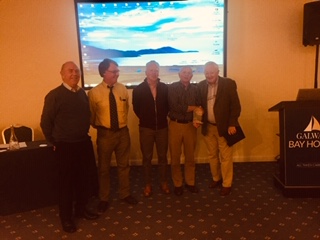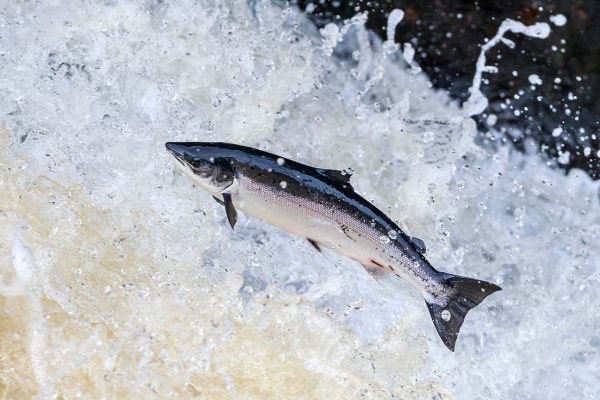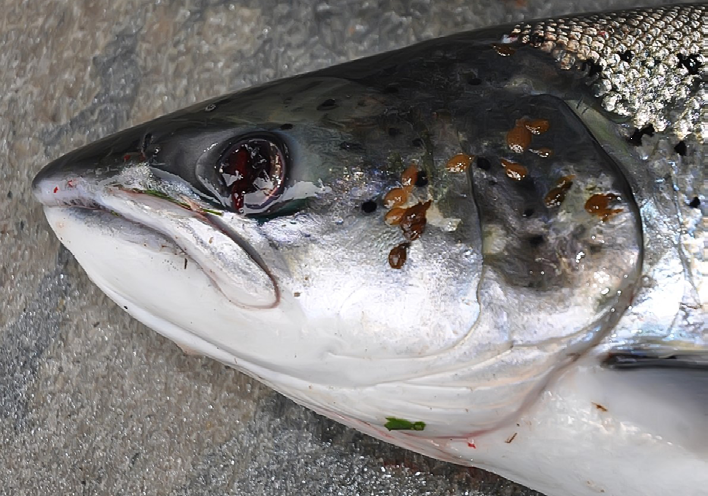-
Salmon Farming – Exposed Scotland’s Appalling Industry
This a must read to understand the effect of salmon farming on biodiversity and the coastal ecosystem. Ireland has a similar profile as Scotland with an even more pressing temperature regime at sea which will exacerbate the disease and parasite problems associated with the industry. The document is extensive and well researched and should be studied by all concerned with wild fish and environmental matters. With its beautiful landscapes and rugged coastline, Scotland is renowned as a wildlife destination. But lurking under coastal waters is a rapidly expanding industry, rife with animal welfare issues and damaging the environment and biodiversity. Known as the King of Fish, with their impressive athletic abilities and epic journey from river to sea and back again, Atlantic salmon are Scotland’s most iconic fish. But these days they are factory farmed in huge numbers where they can migrate no further than the cage walls. Scottish salmon farming has expanded quickly, growing by 41% in the past decade, and the industry has no plans to slow. In 2019 a massive 203,881 tonnes of Atlantic salmon was produced (over 38 million individual fish), but industry growth targets of 300,000-400,000 tonnes annually by 2030, involve a further 47-96% increase in production. Please Read More
Continue reading -
Update on Deenish Island Salmon Farm
Deenish Island - Update 09 February 2021 The proposed closure of the Deenish site owned by MOWI has not taken place despite the Ministerial order to close the farm being issued in April 2019. This is nearly two years ago and during this time period MOWI have launched a High Court Judicial Review of the Ministers decision and also appealed to the Aquaculture Licence Appeal Board. The High Court case was adjourned generally in January 2020 and the case is still under consideration by the Aquaculture Licence Appeal Board (ALAB). It is entirely unsatisfactory that no decision has been forthcoming and the site has continued to operate throughout the period. It is anticipated that the farm will again be stocked this month to start a new cycle which will last until late 2022. The appeal to ALAB is expected to be decided by the end of June 21 but this is not certain and if this decision does endorse the Ministers decision, it would be expected that MOWI would again appeal to the High Court. Meanwhile the sea trout and salmon resource is under severe pressure in Waterville and adjacent catchments. Salmon Watch Ireland has actively pursued the review process and has been active in lobbying both the Department and ALAB to arrive at an early decision. With modern technologies available to MOWI and production strategies to mitigate the effects of sea lice and disease it is alarming that the company continues to operate as before with open net technologies. This type of farming,with no physical barrier separating it from the surrounding ocean, has been causatively linked to the virtual elimination of sea trout stocks in Ireland, Scotland and Norway. The effect on salmon is now better understood and various studies identify that salmon spawning stocks can be reduced by up to 50%. These effects on salmon and sea trout relate to both disease and the effects of sea lice infestation from farms. To put the fish farming situation in perspective in the local Kenmare Bay area the stock of farmed salmon can be up to one and a half million pre-adult and adult salmon residing in two farms while the stock of wild salmon and sea trout now numbers probably less than ten thousand fish in the local area. In effect the wild salmon stock returning to Ireland now numbers less than 220,000 fish so effectively the two farms in Kenmare Bay dwarf Ireland's wild population by a factor of eight. Without the use of modern technologies these farms are a reservoir for disease, parasites and harmful pathogens. The entire west coast of Ireland is practically devoid of sea trout in areas where salmon farms exist, and Waterville is essentially heading in this direction. The economic collapse in the angling tourism sector and ecological destruction of the sea trout in Waterville can be reversed if a new and more environmentally responsible industry is put in place. Closed containment systems are now common in other countries and are evolving constantly. With climatic change gathering pace in Ireland, it is inevitable that fish farm mortalities will increase substantially. Increasing water temperatures will result in more harmful algal blooms and increased densities of jellyfish, both of which have and will cause large scale mortalities on farms. The reservoir of sea lice coming from farms will also increase with a warming ocean effectively reducing generation time giving more lice over the entire year. The advent of closed containment systems will effectively deal with these harmful episodes but will certainly also protect wild fish from sea lice infestation and other harmful effects emanating from open cage farming. There needs to an adult conversation between the Government, the industry and the various stakeholders as to how wild fish populations can be protected. Unless the industry and government regulators are prepared to change it is inevitable that all farm licences will be subject to judicial review in the High Court by vigilant conservation NGOs such as Salmon Watch Ireland. The European Commission is also aware of the specifics of the licensing system of salmon farming in Ireland and a formal complaint has been issued by Salmon Watch Ireland.
Continue reading -
The Status of Irish Salmon Stocks in 2020 with Catch Advice for 2021
Salmon Watch Ireland would like draw your attention to the recently published document from the Technical Expert Group on Salmon. We will answer any questions that you may have or request clarification from TEGOS on aspects that you are concerned with. The links to the reports are listed here: Catch Advice 2021 River Specific Advice The Technical Expert Group on Salmon (TEGOS) advises that in 2021: 48 rivers have an advised harvestable surplus as they are exceeding their conservation limits (CLs). A further 32 rivers, may be opened on a catch and release only basis, subject to IFI management criteria based on having a high probability of achieving 50% of their conservation limit (CL) or exceeding the management qualifying fry threshold of ≥15 fry (0+) per 5 minute electrofishing (multiple site catchment average). In addition 64 rivers are (a) failing to meet 50% of their CL or (b) recent data to determine their CL attainment status are lacking. Where there is a lack of data, or where catchment-wide electro-fishing surveys indicate juvenile abundance below the fry threshold, the TEGOS assumes that these rivers are failing to meet CL. There are 16 rivers for which there are significant fisheries on the MSW (spring salmon) component of the stock and a separate assessment is made. Of these: 11 have an advised harvestable surplus as they are exceeding their CL. 5 rivers may be opened on a catch and release-only basis subject to IFI management criteria as they have a high probability of achieving 50% of their CL or exceed the minimum mean fry threshold (≥15 fry) in catchment-wide electro-fishing. There are currently 40 rivers or river tributaries of the 144 salmon rivers assessed in Special Areas of Conservation (SACs) where salmon have a qualifying interest under the EU Habitats Directive. Of these, only 20 are above their CL.
Continue reading -
Roadmap Policy – Inland Fisheries Ireland
A Roadmap Policy Framework has been launched for Ireland’s Inland Fisheries Wednesday, 27th of January 2021: The Board of Inland Fisheries Ireland (IFI) welcomes Minister Eamon Ryan’s publication of ‘Towards a Policy Framework for Inland Fisheries in Ireland - A Roadmap’. The roadmap forms an important part of the first stage of developing a policy and regulatory framework for the inland fisheries sector. Francis O’Donnell, CEO of Inland Fisheries Ireland said: ‘We encourage all of our stakeholders to get involved in the process of developing this framework for the future of Ireland’s inland fisheries resource. The roadmap is a significant first step in paving the way forward towards a resource that will be conserved and managed in a sustainable way.’ To read more about the roadmap and how to be involved in the process please visit: https://www.gov.ie/en/publication/17099-towards-a-policy-framework-for-inland-fisheries-in-ireland-a-roadmap/.
Continue reading -
Salmon Farming – Letter to new Minister of Agriculture,Food and the Marine
Salmon Farming - Letter from Salmon Watch Ireland to new Minister of Agriculture , Food and Marine Salmon Watch Ireland has written to the new Minister for Agriculture, Food ,Marine concerning the licensing of fish farms in contravention of EU Directives. Salmon Watch Ireland complaint to the EU Commission regarding the continued use of the provisions of section 19A (4) of the Fisheries (Amendment) Act 1997 Supreme Court Judgment of McKechnie J regarding retrospective consents for plans and projects likely to impact on the environment and special areas of conservation. Dear Minister, We would like to draw your attention to the above referenced complaint (which has been assigned reference number CHAP(2020) 01857 by the EU Commission) and a copy of which is already available at official level in your department and to recent Supreme Court Decision of 1 July 2020 and particularly the judgment of McKechnie J. 1 All salmon farm licenses off the Irish coast are now pending renewal under section 19A (4) and a significant number of them for many years. It is now clear from the decision of McKechnie J and the Supreme Court that any renewals of consent must include full environmental impact assessment including ‘Appropriate Assessment’ where such salmon farms can have an adverse impact on European sites including special areas of conservation and special protection areas. See full text of letter here
Continue reading -
Much Improved Grilse Returns – Pose Many Questions
Salmon Watch Ireland is delighted to see much improved grilse and salmon runs to Irish rivers since late May. This has led to many comments as to the nature of why improved runs are entering Irish rivers. It is probably unwise to speculate as to the reasons at this early stage and a clearer picture may arise when the year ends. However when examining this welcome upsurge we may have to look at many aspects of the salmons journey from its feeding ground to their natal rivers and indeed the journey from Ireland as smolts in the previous year. The migration of smolts to sea in 2019 is an obvious place to start and we must examine the freshwater conditions at this juncture to see if increased survival happened at this juncture. Also of interest must be the oceanic conditions which greeted salmon smolts on their migration and at the post smolt nursery areas in the Norwegian sea. After their first sea winter salmon have a decision to make related to maturity as to whether they return as grilse or stay a longer period at sea and return as MSW salmon. Have conditions improved at sea and are large scale climatic indices favourable to historical increased salmon survival norms? The simple answer is that climatic indices seem to be heading towards more favourable conditions which may result in a more favourable temperature regime in the North Atlantic regions where salmon feed. If we are to experience the conditions which normally resulted in abundance then we can assume that bye-catch and predation may only be minor impediments to salmon abundance. However within this situation we may have the impacts of climate change which may affect large scale climate indices in a way which may not follow perceived norms in historical data. Only time will tell. The other reasons that we have encountered relate to bye-catch or directed illegal fishery which may have been reduced substantially by the Covid 19 related reduction in fishery effort and market availability around the North Atlantic. It would seem that this theory has some merits but data regarding the fishery effort must be examined to see if there is merit. A very simple analysis of fishery effort in the Norwegian sea, Icelandic waters and the Faroes during the period from mid March may enlighten the debate. However the capture of such large quantities of adult salmon in previous years may have been difficult to hide. Hopefully this increased trend in salmon stocks continues and that the cause is natural rather than man made. However a number of years in the past have given us false hope notably 2007 but there has been a substantial downward trend from 2008. Increased effort by the illegal fishery both at sea and inland has put enormous pressure on limited protection resources and now more than ever directed information is required from stakeholders by IFI to effectively protect the resource.
Continue reading -
Galway Bay Against Salmon Cages gets Salmon Watch Ireland’s 2019 Salmon Heroes Award
Galway Bay Against Salmon Cages gets Salmon Watch Ireland’s 2019 Salmon Heroes award. Galway Bay Against Salmon Cages gets Salmon Watch Ireland’s 2019 Salmon Heroes award. (21 October 2019) – Salmon Watch Ireland has awarded its Salmon Heroes accolade for 2019 to Galway Bay Against Salmon Cages. The award was presented at the Salmon Watch Ireland’s annual salmon conference in the Galway Bay Hotel, Salthill on 19 October. In making the presentation the chair of the board of Salmon Watch Ireland, Niall Greene, said that: “Galway Bay Against Salmon Cages is an outstanding example of what a non-governmental organization can achieve in the cause of salmon conservation. They came together to combat the placing of a monstrously large open cage salmon farm in Galway Bay. Having successfully accomplished that task they have gone on to become probably the best informed and most active group in the country in the campaign for the ending of open cage salmon farming. They are an inspiration to the all of us in the wild salmon conservation movement”. Receiving the award on behalf of Galway Bay Against Salmon Cages, its’ chair, Billy Smyth remarked: “It is encouraging to have had our efforts to combat open cage salmon farming recognized by people concerned about salmon conservation from all over the country. Ours has been a long struggle and one which has not ended with BIM’s withdrawal of its plans for its’ Galway Bay mega-farm. We continue to struggle with the dubious and often apparently illegal behavior of existing farms, with over-stocking, diseases and escapes and with the unauthorized accessing of fresh water sources. We are adamant that if salmon farming is to have a future in Ireland it can only be through the phasing out of open cages and the transfer of all farming activity to land-based facilities’. ------------end------------ For further information contact: Niall Greene 086 826 9222 John Murphy 086 399 1074
Continue reading -
Salmon Watch Ireland – Consultation on Policy Document
More and Stronger smolts ‘The rational management approach is to redouble efforts to address factors impacting on productivity to ensure that …. salmon rivers…. produce the maximum number of healthy wild salmon smolts’ Background – Salmon stocks are close to crisis point Before reading our Policy Document it might be advisable to review the present state of Atlantic salmon in Ireland. In conjunction with the following paragraphs and the short film you will be able to appreciate the many factors affecting Atlantic salmon and sea trout stocks in Ireland. We would appreciate your views on the Policy document and any ideas you may have to help progress conservation of these iconic fish. It is not an exaggeration to suggest that, in the lifetime of people living today, Ireland’s wild Atlantic salmon could become a curiosity confined, at best, to a small number of rivers. The species may not become totally extinct (although it could) but there may not be sufficient stock for either commercial or recreational exploitation. A species that has huge Irish heritage and folklore significance and which, in the past, has had major social, economic and recreational value could to all intents and purposes be lost. There is an obligation on all of use to do our utmost to prevent that happening in the interests of our own and of future generations. It will not be an easy task. Read More
Continue reading -
Marine Institute Report – Newport Salmon and Sea Trout 2015
This report from 2015 is a very interesting read with lots of very informative data available. Salmon Watch Ireland is particularly interested in the data relating to sea trout….
Continue reading -
Annual Conference Galway 19th Oct 2019- Salmon Watch Ireland
Please note that this conference will help all stakeholders to understand the concepts involved in Closed and Semi Closed Containment in regard to salmon farming. It is…
Continue reading













